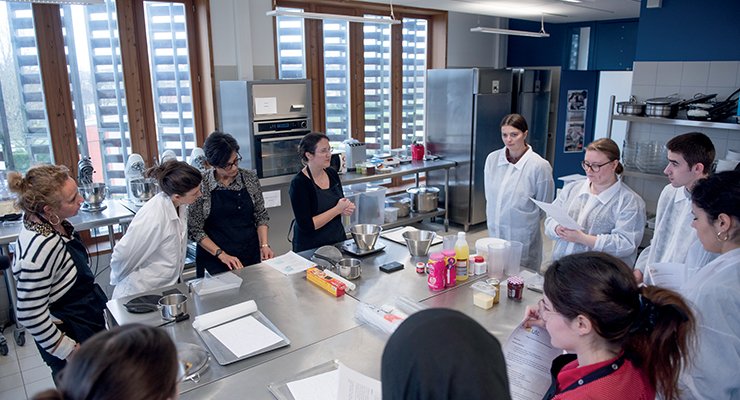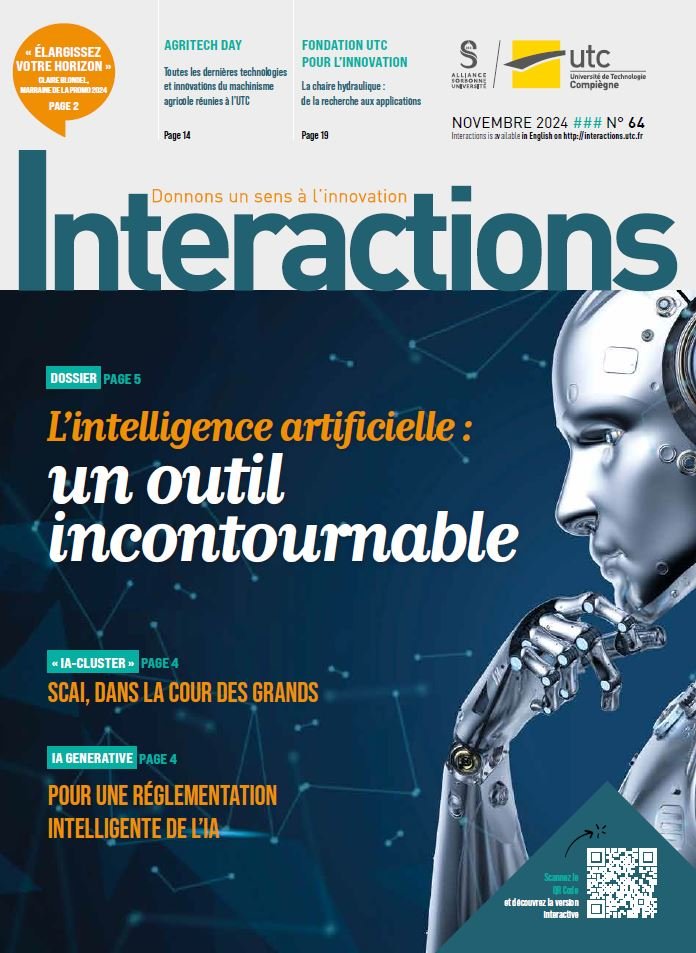Winter is Cooking

From January 29 to February 9, 2024, UTC hosted the International Winter School in Food Engineering and Nutrition, taught in English and dedicated to innovative food formulation and nutrition.
Developed as part of the Innovation, Food, Agroresources (IAA) Biological Engineering specialty course at UTC, students from the Nutrition, Quality and Health master’s degree in Integrative Biology and Physiology at Sorbonne University (SU) and others from the UTC’s international partner universities were able to take part in the Winter School in Food Engineering organised at UTC from January 29 to February 9, 2024. The Université de Technologie de Compiègne and Sorbonne Université had proposed the theme «food engineering school». On the programme for the participants: the latest knowledge in nutrition and the science of gastronomy, approached from a theoretical point of view, but also and, above all, from a practical point of view. It was a highly rewarding experience, and provided new ideas that may one day find their way onto our plates.
Funded by the Alliance Sorbonne Université (ASU), this Winter School is another fine example of an innovative joint project between UTC and Sorbonne Université. «Yes, I would remind you that UTC is a member of the Alliance Sorbonne Université (ASU) and that we want to be even more inclusive, proposing new formats and combining our skills to offer something innovative to all our students and partners,» says Prof. Claire Rossi, President and Executive Vice-Chancellor of UTC, responsible for the international winter school programme on food engineering and nutrition. The school’s theme is fully in line with the SOUND project, «SOrbonne University for a New Deal», co-constructed with Sorbonne University and the partners of the Sorbonne University Alliance. The approach used in this Winter School is a combination of theoretical courses, workshops and project-based learning. Teams of participants were able to develop an innovative food product over the course of two weeks, with the aim of presenting a prototype at a final “defence” in front of a jury made up of members of Sorbonne Université and UTC. The teams were supervised by Biological Engineering teachers, experts in the field of food science and food innovation.
An innovative combination of food science, nutrition and French gastronomy
The latest trends and knowledge in gastronomy and nutrition were covered in theory and applied in practice to the preparation of famous French dishes with an added touch of health. «This international winter school is an original blend of food science, technology and French gastronomy. The programme involves learning how to improve the level and nutritional profile of food products, by modulating their composition, textures and cooking methods, while retaining as much of the flavour and nutrients of the original ingredients as possible. The aim of the course is to provide a theoretical and practical overview of the development of food products using a reasoned formulation approach,» explains Mirian Kubo, head of the Food and Agroresources Innovation programme and lecturer-research scientist at UTC.
Innovative technological solutions were presented and applied to prepare healthier versions of world-famous food specialities. «The theoretical part covered the physico-chemical processes involved in the production of food products, the biochemical, nutritional and functional aspects of ingredients, the various texturising agents and the latest innovations in offering substitutes for diets that are too rich in saturated fats, sugars and foods with a high glycaemic index, among other things. All these concepts were put into practice during the workshops organised in the afternoon,» she adds. Chef Ludovic Colpart, chef and owner of the Auberge du Pont restaurant in Rethondes, came along to lead a lemon meringue tart workshop. Participants were able to discover French gastronomy through the preparation of typical sauces, dishes and desserts, such as “macarons”, with an added healthy touch… while applying innovative approaches to food formulation.
The opinion of Julia Lentin, aged 25, a masters student at Sorbonne University
Julia Lenin specialising in health and quality nutrition with a view to becoming a health, hygiene and safety quality manager in the agri-food industry.
«What I’ve learnt from this experience is that making a product is no easy task. We experimented a lot during the practical work on texturisers, what can be used to replace sugar and fat, and I realised that this requires a lot of trials, failures and numerous tests. We tinkered with fibres and proteins. And using one or the other doesn’t give the same result at all. It was quite challenging. With my group, we created ‘compotes’ and ‘purée’s based on sweetened vegetables, with senior citizens as the main target consumers».
A crunchy chocolate and peanut cake for Tom Laperche
The cakes were developed for skipper Tom Laperche by five Biology Engineering students: Amandine Guillou (Bio-Engineering major — specialty IAA course), Anais Sanchez (Bio-Engineering major ), Idriss Ait-Tahar (Bio-Engineering major specialty MPI course), Manon Langelez (Bio-Engineering major IAA course) and Socheata Ouk (Bio-Engineering major IAA course). This project was carried out as part of the BT07 UV (Formulation, Innovation, Nutrition) and supervised by Claire Rossi and Mirian Kubo. The cakes were sources of proteins and were rich in fibre. The aim of the project was to provide Tom Laperche with a sweet snack that he could eat every day on his boat for the Arkea Ultim Challenge, a fifty-day solo round-the-world race on a giant trimaran.
«This snack also had to be interesting from a nutritional point of view, taking into account the fact that Tom Laperche is making a regular physical and mental endurance effort. First of all, we drew up a specification for our product based on Tom Laperche’s requests. We then produced several prototypes by mixing different protein flours, a low Glycemic Index sweetener, eggs, fibre, oilseeds and chocolate. The prototypes were sent to Tom Laperche so that he could taste them and give us his initial opinion,» explains Anais Sanchez, a student in biological engineering. Following his feedback, we optimised our biscuits, particularly in terms of texture (cooking time and thickness). The final product is rich in fibre, a source of protein, contains good lipids and has a chocolate/peanut flavour, with a Nutriscore C. They were packaged in batches of seven to reduce plastic packaging as much as possible and the packaging was vacuum-packed to preserve all the organoleptic properties of our product.
3 questions for Véronique Béréziat, professor véronique béréziat, chair of physiology at Sorbonne University Alliance
Tell me more about UTC’s “Winter School”?
It’s a wonderful and highly rewarding cooperation between UTC and Sorbonne University Alliance. It provides two weeks of hard work that have resulted in the development of innovative and healthy food products. This is a long-standing collaboration with Prof. Claire Rossi to offer teaching on the theme of food and health at UTC. Over the course of our interactions, as Claire Rossi had set up a Summer university with more or less the same format, we thought it would be very interesting to be able to set up something similar. Thus, for almost two years, we prepared a project that we submitted to the Sorbonne University Alliance. This is also the objective of having a Sorbonne University Alliance. It encourages interaction and we can take advantage of each other’s facilities to train our students for excellence in every field. Consequently, this teaching is really part of the educational contract for the apprentices we register each year. We hope to secure long-term funding and continue to offer these courses with UTC.
How did the project come about?
We have a course called Nutrition, Health Quality within a Master’s degree in Integrative Biology and Physiology at Sorbonne Universities. In this course, students are trained in questions appertaining to food safety, nutritional communication and nutritional innovation and we wanted to set up an apprenticeship version. In the traditional pathway, students choose a specialisation and in the apprenticeship pathway, we want to train them in all three areas. What was missing from the training we were offering was expertise in nutritional formulation. That’s why we set up this Winter School on Training and Innovation in Nutrition. We had sufficient funding to welcome the students and pay for their accommodation. They were provided with food and lodging, as well as having all UTC facilities at their disposal. This winter saw the first intake of students, small in numbers, but that was by design. The time was ripe to get things up and running and to be able to do enough publicity to recruit more and more apprentices.
What is the added value of this teaching?
The added value of this course is that it looks at the relationship between food and health. From a theoretical point of view. We also give them innovation projects in which they can imagine either the foods of tomorrow, or start-ups to create these new products. They were able to test their ideas using UTC equipment. In fact, what we really want is to professionalise them and enable them to touch on the aspects of innovation in nutrition in the theoretical parts, which are even stronger at UTC than what we give them at Sorbonne Université and, above all, the practical part using the technology intensive equipment that exists already at UTC. It also enables them to think about the harmful side of ultra-processing and to develop new recipes that could be made at home, that combine food and health aspects.




